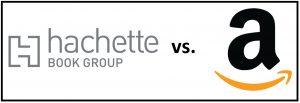 Leonard Sherman of Columbia Business School, the author of that Amazon/Hachette op-ed that was briefly on Fortune until it disappeared during a web site upgrade, contacted me to let me know he had posted another piece to his blog. This was conceived as a response to the New York Times op-ed by Bob Kohn (which we mentioned here); however, the Times didn’t see fit to print it.
Leonard Sherman of Columbia Business School, the author of that Amazon/Hachette op-ed that was briefly on Fortune until it disappeared during a web site upgrade, contacted me to let me know he had posted another piece to his blog. This was conceived as a response to the New York Times op-ed by Bob Kohn (which we mentioned here); however, the Times didn’t see fit to print it.
In this piece, Sherman lays out how and why the publishing industry came to be in its predicament, which he lays at the feet of the decades-old system of returns, accounting for as much as 40% of books industry-wide, and the consolidation of most publishers into the blockbuster-driven Big Five. When Amazon came along, they were entirely unprepared for its disruptive effect.
Sherman adds that even if the publishers hadn’t been forced to roll back their illegal collusive price-fixing scheme, and even if Amazon were to start playing nice with Hachette, the real problem the traditional publishers face isn’t going to go away.
Thus, despite the recent tsunami of negative press being directed towards Amazon, this dispute is ultimately not about whether Amazon is a monopolist or monopsonist. Nor is it about whether Amazon is trying to use books as a loss leader to sell other merchandise or whether the company is treating Hachette, authors or its own customers fairly. It is also not about whether book publishers as currently configured are an essential bedrock of our society.
It is about whether publishers can retool their business capabilities to maintain a vital role in adding value to all stakeholders in an industry where books will increasingly be produced, marketed, reviewed and sold in profoundly different ways.
Sherman points out that many authors who would once have submitted their manuscripts to the traditional publishers are now fully aware of their other options, and in order to woo them publishers are going to have to be able to offer them more value than they do now. If the publishers can’t get their act together, they might find themselves with a lot fewer books to publish.
It’s too bad the New York Times didn’t want to print this piece. But then, it’s not exactly a surprise, either. Given that New York is the home of the traditional publishers, I suppose it makes sense they’d be more inclined to “root for the home team.”

































It’s an interesting article, but Len Sherman fails to deal with what’s perhaps the most critical factor. An Amazon powerful enough to dictate terms to the major publishers is one more than powerful enough to ride roughshod over the many tens of thousands of authors who’ve turned publisher to get a bit more for each sale. Many authors may discover that leaving a publisher for self publishing is like jumping from a frying pan into the fire.
To put numbers on the issue. Whatever the large publishers are paying their authors for ebook royalties at the moment, the sheer economy of unlimited and virtually free digital copies with no returns means it’ll be quite easy for their authors to demand and get more than 35% royalties. They don’t need to self-publish for that. All they need are enough loyal readers, a less-than-binding contract, and a different publisher willing to pay more. Competition among publishers will serve as well as a catalyst for higher ebook royalties. as self-publishing without many of the downsides.
Why did I suggest that number ‘greater than 35%.’ Because that’s what Amazon currently pays independents outside the limited $2.99-$9.99 range. The fact that ebooks over AND under than range get less is a powerful hint the 35% is what Amazon thinks author and publishers ought to be getting. Only competition from the likes of Apple keeps that 70% (less download fee) in play. If fact, it I recall correctly, Amazon only began paying that almost 70% after Apple did.
The thinking of all too many authors is an utter muddle when it comes to Amazon. First they think fondly of Amazon as the publisher who took first their POD book and now their ebook when no other publisher was interested.
That’s utter bosh. Before Amazon’s own CreateSpace POD affiliate, Amazon simply did what a host of other online retailers did, which was distributed POD books printed by Lightning Source and distributed by Ingram. I know. I routined checked their websites when I published a new book and within a week or so it would appear there. Aware that one particular book of mine might be popular in Israel, I checked and found it was available on about half-a-dozen book retailers there, none of them Amazon. In the sense of bringing your book to market, Amazon is not a books publisher. It’s simply on retailer among many.
And yet at the same time, Amazon does put on publisher’s hat and dictate all sorts of conditions to authors who aren’t going through a buffer such as Lightning Source (print) or Smashwords (ebooks). In fact, I suspect that Amazon and Smashwords have yet to strike a detail because Amazon doesn’t want a middleman looking out for authors. It want every author to face it alone and powerless.
Perhaps the best way to think of Amazon is to realize that, in almost all the ways that publishers are a nuisance to authors, Amazon adopts a publisher’s role. It dictates price-based royalties. It decides what a book’s sample contains. It dictates the terms if you sell an ebook and print book together. And as this Hachette dispute illustrates, it will dictate a book’s availability.
Even Amazon’s royalties are rotten. Create a specialized textbook with a limited audience and price it for $20. Apple will pay you $14 for each copy sold and Smashwords will pay you $16 less a financial transaction charge. Miserly Amazon will only pay you $7. As publisher go, Amazon is one of the worst.
On the other hand, where a publisher can be helpful, Amazon comes up woefully lacking. It won’t provide you with editorial assistance and proofing when you’re writing. It won’t promote your book once it’s published. In that it is a mass-market retailer and nothing else.
That’s because there’s a critical difference between a real publisher and Amazon. A real publisher wants to sell your book. Amazon only wants to sell books. If they make more selling your book, they will puff it. But if they can make a bit more selling a competing book, they’ll find ways to make it more visible to potential customers than your book.
Amazon has no loyalty to you because, despite the illusions of many authors, Amazon isn’t selling anyone’s book. It’s selling everyone’s books.
It may make sense to publish your book through a traditional publisher or it may make sense to publish it yourself. What does not make sense is be part of a book distribution system dominated by an Amazon that wants to reap all the financial benefits of being a publisher with none of the liabilities.